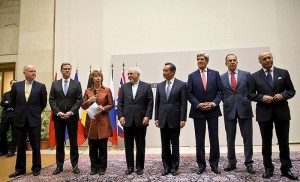 A recent press release by the White House, alleged to be the text of the nuclear agreement struck between Iran and six world powers in Geneva, is in stark contrast with the original text of the deal.
A recent press release by the White House, alleged to be the text of the nuclear agreement struck between Iran and six world powers in Geneva, is in stark contrast with the original text of the deal.While the White House piece claims that Tehran has committed to halt progress of its stockpile of 3.5% low enriched uranium, the original text of the nuclear deal between Iran and the five permanent members of the United Nations Security Council -- the United States, China, Russia, France and Britain -- plus Germany states that Iran will not enrich uranium over 5% within the next six months.
The agreement, signed in Geneva on Sunday, over Iran�s civilian nuclear work further notes that from the existing uranium enriched to 20% of purity, Iran will retain half as working stock of 20% oxide for fabrication of fuel for the light-water Tehran Research Reactor, and dilute the remaining 20% uranium hexafluoride (UF6) to no more than 5%.
The Geneva accord adds that when the line for conversion of UF6 enriched up to 5% to uranium dioxide (UO2) is ready, Iran will convert to oxide, UF6 newly enriched up to 5% during the six-month-period, as provided in the operational schedule of the conversion plant declared to the International Atomic Energy Agency (IAEA).
Whilst the original text of the Geneva accord and the White House paper both note that Iran has undertaken the voluntary measure of not reprocessing or constructing a facility capable of reprocessing, the latter document refers to a point not mentioned in the nuclear deal: Without reprocessing, Iran cannot separate plutonium from spent fuel.
Despite the fact that the Geneva nuclear agreement states the six world powers have agreed to suspend US and European Union (EU) sanctions on Iran�s petrochemical exports, gold and precious metals as well as Iran�s auto industry without any reference to the amount of the money that Iran could reap in relief from the economic sanctions, the US document writes that sanctions relief on Iran would potentially provide Iran approximately USD 1.5 billion in revenue.
Furthermore, the actual text of the interim deal in Geneva over Tehran�s nuclear energy program states that the five veto-wielding permanent UN Security Council members and Germany have accepted to pause efforts to further reduce Iran�s crude oil sales, allow Iran�s current customers to purchase their current average amounts of crude oil, and facilitate the repatriation of an agreed amount of revenue held abroad.
The White House document, however, reads that USD 4.2 billion from the sale of Iranian crude oil will be allowed to the Islamic Republic in installments if, and as, Iran fulfills its commitments.
In addition, the original text of the nuclear accord between Iran and the six major world powers does not mention how much Iran will earn from sanctions relief within the next six months, but the White House paper says the approximately USD 7 billion in relief is a fraction of the costs that Iran will continue to incur during the six-month period under the sanctions that will remain in place.
The White House document adds that while Iran will be allowed access to USD 4.2 billion of its oil sales, nearly USD 15 billion of its revenues during this period will go into restricted overseas accounts.
It further claims that US officials expect the balance of Iran�s money in restricted accounts overseas to increase, not decrease, under the Geneva nuclear deal.
While the original text of the nuclear agreement between Iran and the Sextet of world powers calls for the establishment of a financial channel to facilitate humanitarian trade for Iran�s domestic needs using Iranian oil revenues held abroad and clearly reads that this channel would involve specified foreign banks and non-designated Iranian banks to be defined, the White House piece states that the vast majority of Iran�s approximately USD 100 billion in foreign exchange holdings remain inaccessible or restricted by US sanctions.
By Press TV
The Iran Project is not responsible for the content of quoted articles.










